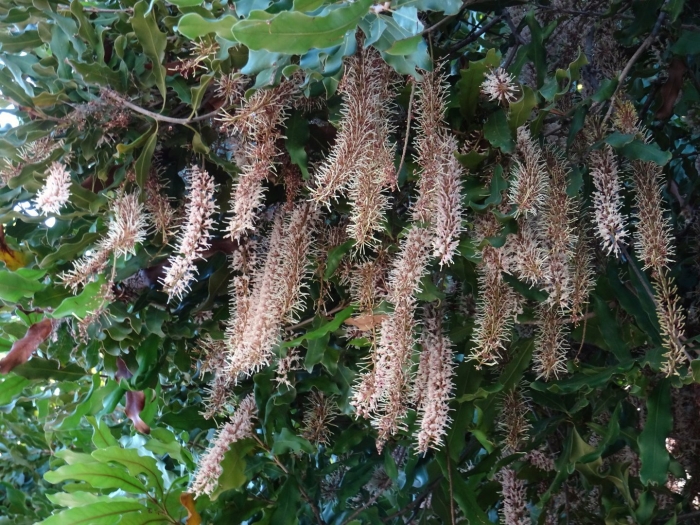Macadamia Nut
(Macadamia tetraphylla)
Macadamia Nut (Macadamia tetraphylla)
/
/

Tatters
CC BY-SA 2.0
Image By:
Tatters
Recorded By:
Copyright:
CC BY-SA 2.0
Copyright Notice:
Photo by: Tatters | License Type: CC BY-SA 2.0 | License URL: https://creativecommons.org/licenses/by-sa/2.0/ | Uploader: Tatters | Publisher: Flickr |














Estimated Native Range
Summary
Macadamia tetraphylla, commonly known as Macadamia Nut, is an evergreen tree native to rainforests and wet sclerophyll forests in southern Queensland and northern New South Wales, Australia. This species can reach up to 18 meters in height and is characterized by its dense, dark green foliage. The leaves are arranged in whorls of four, hence the name ’tetraphylla.’ It produces long, pendant flower spikes with white to creamy pink flowers that are subtly fragrant, blooming from late winter to spring. The flowers are followed by woody, rounded fruits, 2 to 3 cm in diameter, containing the commercially valuable edible seeds or nuts. The nuts are encased in a hard, green-brown shell that splits open as they mature.
Macadamia Nut trees are valued for their nuts, which are a popular food item due to their rich flavor and nutritional benefits. They are also cultivated for their ornamental qualities and are used in large gardens and parks. The tree requires well-drained soils, consistent moisture without waterlogging, and a position in full sun to partial shade. While they are relatively low-maintenance once established, they can be susceptible to root rot in poorly drained soils and may attract pests such as macadamia nut borers. It is important to note that the leaves and flowers contain toxic cyanogenic glycosides and should not be ingested by humans or animals.CC BY-SA 4.0
Macadamia Nut trees are valued for their nuts, which are a popular food item due to their rich flavor and nutritional benefits. They are also cultivated for their ornamental qualities and are used in large gardens and parks. The tree requires well-drained soils, consistent moisture without waterlogging, and a position in full sun to partial shade. While they are relatively low-maintenance once established, they can be susceptible to root rot in poorly drained soils and may attract pests such as macadamia nut borers. It is important to note that the leaves and flowers contain toxic cyanogenic glycosides and should not be ingested by humans or animals.CC BY-SA 4.0
Plant Description
- Plant Type: Tree
- Height: 30-40 feet
- Width: 15-20 feet
- Growth Rate: Slow
- Flower Color: White
- Flowering Season: Spring, Summer
- Leaf Retention: Evergreen
Growth Requirements
- Sun: Full Sun, Part Shade
- Water: Medium
- Drainage: Fast
Common Uses
Bird Garden, Butterfly Garden, Edible*Disclaimer: Easyscape's listed plant edibility is for informational use. Always verify the safety and proper identification of any plant before consumption., Fragrant, Showy Flowers
Natural Habitat
Native to rainforests and wet sclerophyll forests in southern Queensland and northern New South Wales, Australia
Other Names
Common Names: Bauple Nut, Prickly Macadamia, Queenslandnut, Macadamia-Nut, Poppelnut, Rough-Shell Queenslandnut, Rough-Shell Bushnut, Rough-Shell Macadamia, Rauhschalige Macadamia, Rauhschalige Macadamianuß
Scientific Names: , Macadamia tetraphylla,
GBIF Accepted Name: Macadamia tetraphylla L.A.S.Johnson